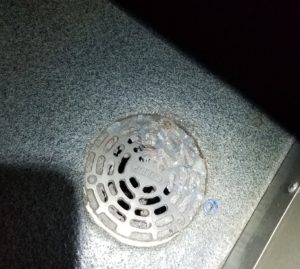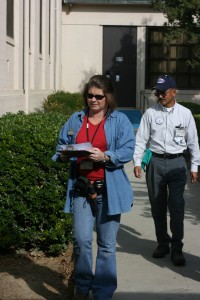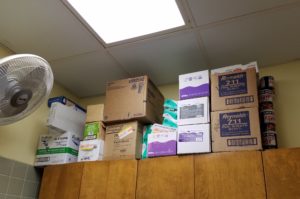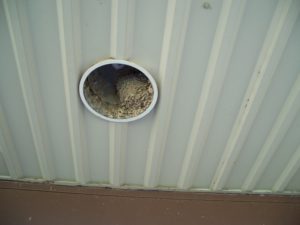Summer in Texas means high temps and high humidity, it also means schools are busy cleaning, repairing and preparing for the next school year. For many of you this means several projects at once and can be overwhelming. This summer tips are ways you can share with your fellow summer school employees how they can help your IPM/IAQ program while you work this summer.

This floor drain is an example of what wax build up can look like and how it can hamper water flow, which allows for cockroaches to move in.
Floor Drains – These are the nastiest places on school campuses, especially when floor drain covers have been repeatedly waxed and little or no water can go down the drain. In food prep areas, kitchen and culinary art room’s floors are washed down but the food doesn’t make it down the drain and builds up by the drain guards. No matter the problem, floor drains need to be maintained in order to keep American cockroaches, drain flies, and other small pests from moving in. Here are some tips to think about this summer:
- Install trap guards – these rubberized gaskets slip into the top of the drain, they allow water and debris to go down, but once that has happened there is a flap that doesn’t allow for anything to come back up. The trick here is to make sure that the cover plates for the drains have enough openings to flush water through.
- Clean the drains – there are a number of drain enzyme cleaners that can help with eliminating organic matter build up. Floor drains can become a harborage for food borne illnesses, flies and roaches can spread these pathogens, just as power washing and splashing that organic matter all over the kitchen. Bleach is not a good alternative as well, you need a substance that will stick to the organic build up and help break down and allow it to go out with other grey water materials.
- Repair the drains – in our ever shifting soils in Texas (and other places as well) plumbing fixtures move. This movement can be as simple as an escutcheon
plate coming loose, to drain pipes sinking and pulling away from toilet fixtures. If you are constantly seeing a specific pest in an area and you are not finding a solution, consider a full plumbing inspection. Drain flies, springtails, American cockroaches can all be indicators of a moisture issue, don’t just assume they will go away without a proper inspection.
Classroom cleaning – the practice of pulling everything out of the classroom and cleaning that area is something not every school system does. Depending on staff and budgets, depends on how much this extra deep cleaning can be done. No matter the staff or location, clutter removal and organization is important to the IPM and IAQ program. Here are some tips while staff is cleaning to be on the lookout for:
- Large amounts of sawdust, dirt, or shredded paper – when furniture is moved and areas are exposed for cleaning (now easy to inspect) remind staff to be on the lookout for odd signs of pests. Moving a cabinet and finding what appears to be sawdust or lots of black specks could be evidence of ants, termites, cockroaches or even mice. Take pictures to document, have the area cleaned up and monitor for pests. Not reporting this type of evidence can hide a small pest problem that could turn into something major later on.
- Cardboard and paper – even with technology schools still have a large quantity of paper and cardboard boxes to store that paper. Kitchens, concession stands, staff support rooms, and classrooms all collect a lot of paper, books, teaching supplies and other items that can be used and reused. However, storing in cardboard or keeping large amounts of paper out and on walls can lead to future pest problems. Silverfish, cockroaches (all species), ants, mice, and mold can thrive with a good paper source, just add a little humidity for moisture and you have the perfect conditions for a variety of pests to survive. At the same time, large amounts of clutter can also contribute to dust, dust mites which can trigger asthma and allergy systems. Instead of keeping all this paper and cardboard, encourage reducing, recycling and storing in plastic storage containers. Those plastic bins can be easily moved and classroom items can easily be labeled so that anyone can find items but not have to look at a large mess as well.
- But what about cost for those containers – check with your local big box stores, hardware stores and others, many companies have grants or scholarships that school districts can apply for that would cover the expense of purchasing the containers. Then use your parent volunteer groups to help campuses get organized – you can DYI it with parents and students to make it more fun.
Outdoors – during the summer, the focus outdoors is keeping lawns mowed, athletic fields maintained and working on landscape projects that can only be done when students are not present.  However, when no one is around the campus, this is a chance for wasps, yellowjackets, bees, birds and bats to move in.
However, when no one is around the campus, this is a chance for wasps, yellowjackets, bees, birds and bats to move in.
- Take a walk – need to get your steps in? You could start an entire fitness campaign using IPM by just walking the exterior of a campus.
Don’t rely on your pest control contractor to be the only person walking around the exterior of your school campuses, enlist the help of campus staff during the summer. Each campus has some staff around during the summer, talk to the campus principal about appointing someone to be on the lookout for those nests showing up. The time to react to the pest problem is early not in late August when staff and students are back in session.
- Bait for ants – with all the spring rains all ant species will be out this summer, not just at your 4th of July picnic. When temperatures go above 90 degrees during the day and the overnight low is low 80’s or high 70’s baiting for ants becomes challenging. However, if you don’t want to spend your fall months answering calls and complaints about ants, work a plan to bait later this summer in the early mornings. Green category baits will take a few weeks to work, so you want to time your applications so that the bait has had time to work before students are back on campus. Depending on your work schedule and where you are located, you can also bait in the evenings after the sun has started to set so the bait is out during the cool of the evening. When it is really hot ants will come out during the night hours to forage for food or cool of the morning.
- Mosquito management – watch for those areas that water can collect and become stagnant. If you can’t eliminate those areas, then do use Bt Dunks, granules, or mosquito fish (ponds) so that mosquitoes don’t have a chance to breed. Do be sure to stress the importance of the 4 – D’s: Drain, Dress, Dusk, and DEET to all your co-workers. It’s important that all employees understand that you can prevent mosquito bites by taking the right precautions. Share this interactive website with your co-workers so they can learn more about mosquitoes. http://mosquitosafari.tamu.edu/
Want a safe way to be outside and not get bitten? Check out these mosquito suits, its fine mesh netting that fits like a jacket and pants; you can be covered from head to toe. For a grounds person working in a marshy area this would be ideal.
Remember IPM is everyone’s responsibility it takes everyone in the school district to have a successful IPM program. There is no “I” in IPM it’s all about TEAM. Have a wonderful summer. TX School IPM Team.
Want to share this will your school staff – download this flyer and feel free to print and distribute. SPN_Summercleaningtips





 .
.